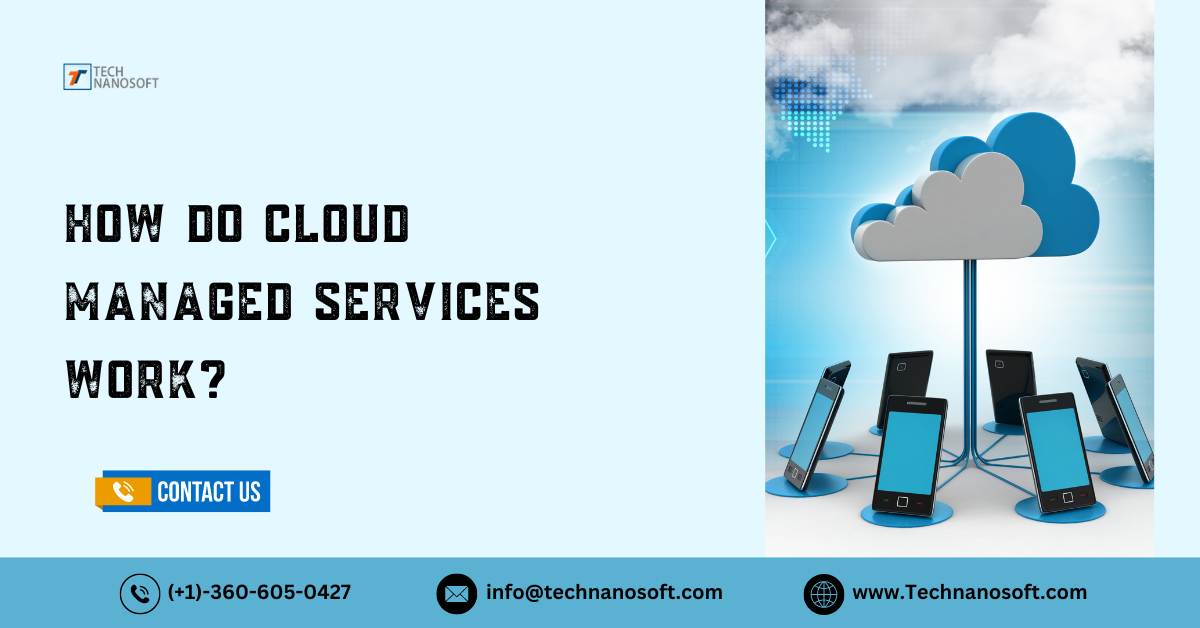How Do Cloud Managed Services Work?

Cloud management services are essential in today's digital environment for assisting businesses in navigating the intricacies of cloud computing. These services cover a wide range of duties, such as the setup, upkeep, security, and optimization of cloud infrastructure. Businesses can make things run smoother and save money by getting help from Managed Cloud Service Providers (MCSPs).
These experts handle tasks like managing different cloud platforms such as AWS, Azure, and Google Cloud. This helps businesses run their apps and store data better, making everything work well together.
What Is a Managed Cloud Service Provider (MCSP)
A managed cloud services Provider (MCSP) is a qualified organization that provides businesses with all-inclusive cloud management services. These service providers are good at organizing and making cloud stuff work smoothly. They help companies use all the cool things about cloud computing while making things easier to handle.
MCSPs handle tasks like setting up the cloud, moving data around, making sure everything is safe, following rules, keeping an eye on things, and helping out when needed. They make sure to do things in a way that fits what each company needs and wants.Businesses can get professional advice, hands on help, and support around the clock for their cloud stuff by teaming up with an MCSP. This means they can count on their cloud systems being safe, able to grow when needed, and always working well.
Types of Cloud Managed Services
IaaS
Discover the flexibility of cloud computing resources with Infrastructure as a Service (IaaS), providing scalable business solutions. With managed Infrastructure as a Service (IaaS) services, you can access virtual machines, storage, and networking over the internet. This means you don't have to worry about maintaining physical infrastructure yourself. Take advantage of smooth scaling and effective resource management without sacrificing performance.
PaaS
Platform as a Service (PaaS) provides a comprehensive platform for enterprises and streamlines the development and deployment of applications. With managed PaaS services, databases, middleware, and development tools are all provided in a single, integrated environment, making infrastructure management less complicated. Use PaaS to manage application lifecycles more effectively and simplified, from development to deployment.
SaaS
Software as a Service (SaaS) allows you to easily access a variety of software programs without the need for local installations. Managed SaaS services provide online subscription-based access to productivity tools, email, and CRM for enterprises. Enjoy trouble-free software management with the service provider's managed support and maintenance.
Managed Cloud Storage Services
Make sure your storage options are safe, scalable, and managed. These services guarantee the availability, integrity, and security of data in the cloud and include data backup, archiving, and disaster recovery. Take advantage of managed support for access restrictions and data management, which enables effective use of storage resources and ideal data security.
Managed Cloud Security
With extensive managed cloud security services, safeguard your cloud environments against online attacks. These services provide a safe and compliant cloud infrastructure and encompass threat detection, prevention, and incident response. Get managed help for governance, compliance, and security monitoring to protect your most important assets and keep your business compliant with regulations.
Managed Cloud Migration and Integration
With managed cloud migration and integration services, make the move to the cloud easy. These services make it easier to evaluate, organize, and carry out migration projects, guaranteeing an efficient and successful transfer of IT applications and Infrastructure. Take advantage of managed help for continuous integration and optimization, which enables companies to utilize cloud computing fully.
Important Things To Think About When Selecting a Cloud-Managed Services Provider
Knowledge and Experience
Selecting a managed cloud service provider (MCSP) with extensive experience and deep market understanding is essential. No matter if you picked Google Cloud Platform, Microsoft Azure, or Amazon Web Services, it's important to check if the provider's team has the right experience by looking at their qualifications and certifications. Their ability to manage your cloud stuff well helps your business run smoothly and efficiently, matching what your company wants to achieve.
Security Measures
When selecting an MCSP, security must be given priority. Robust protection of your sensitive data is ensured by evaluating their access restrictions, data encryption techniques, and compliance certifications such as SOC 2 and HIPAA. By going over their disaster recovery and incident response plans, you can ensure that business operations continue unhindered and lessen the effect that outages or security events will have on your company.
Service Offerings
An MCSP's range of services is essential to fully satisfying your cloud needs. Making sure their services cover every facet of your cloud operations is crucial, from migration to continuous management, security monitoring, and round-the-clock support. Their products are matched to your unique cloud objectives, be it cost control or performance enhancement, to guarantee a customized approach for your company.
Security Measures
Selecting an MCSP requires giving security priority. Robust protection of your sensitive data is ensured by evaluating their access restrictions, data encryption techniques, and compliance certifications such as SOC 2 and HIPAA. By going over their disaster recovery and incident response plans, you can ensure that business operations continue unhindered and lessen the effect that outages or security events will have on your company.
Service Offerings
An MCSP's range of services is essential to fully satisfying your cloud needs. Making sure their services cover every facet of your cloud operations is crucial, from migration to continuous management, security monitoring, and round-the-clock support. Their products are matched to your unique cloud objectives, be it cost control or performance enhancement, to guarantee a customized approach for your company.
Scalability and Flexibility
One of an MCSP's primary capabilities is the capacity to adjust to your changing requirements. Seek suppliers of scalable services that can adapt to your consumption habits so you can minimize expenses while still getting what you need. This scalability is further enhanced by flexible pricing methods, which let you scale resources up or down as needed without sacrificing effectiveness or going over budget.
Transparency and Communication
A successful collaboration with an MCSP depends on efficient and transparent communication. Selecting a cloud service provider that upholds open lines of communication and sends out frequent reports on the security and operation of your cloud environment promotes accountability and trust. Transparency and expectation alignment are ensured by explicit service level agreements (SLAs) that specify service guarantees and response times.
Cost considerations
Comparing pricing models from several MCSPs guarantees competitive value, even though cost shouldn't be the only deciding factor. Making an informed choice requires taking into account the entire cost of ownership, which includes all up-front expenses, continuing maintenance fees, and other hidden expenditures. Finding the ideal balance between price and service quality guarantees the best return on your investment.
References and Reviews
It's priceless to learn from an MCSP's previous clients through references and reviews. Their accounts and contentment levels offer insightful information about the calibre and standing of the service provider. You can enhance this input by reading industry magazines and online reviews, which will enable you to make an informed decision based on suggestions and your own experiences.
READ ALSO - How is AI in sports changing the industry? applications and use cases?
The Top 7 Advantages of Managed Cloud Services
Cost Savings
Utilize a pay-as-you-go strategy, eliminate upfront hardware expenditures, and reduce the requirement for IT workers in order to realize considerable cost savings with cloud managed services. Businesses can save money on hardware purchases and internal IT staff maintenance by outsourcing infrastructure management. Pay-as-you-go pricing maximizes your IT budget by ensuring that you only pay for the resources that you really utilize. Benefit from cost-effective operations and the newest resources and technology without having to make large upfront expenditures with cloud managed services.
Cybersecurity Support
Managed service providers provide advanced tools and crucial knowledge for proactive cybersecurity measures, such as threat detection, prevention, and security patch management. Managed service providers improve your organization's cybersecurity posture by reducing risks and safeguarding sensitive data with their specialist knowledge and resources. Businesses can fortify their defences against cyberattacks by collaborating with a managed service provider. This will guarantee a safe and dependable cloud environment that protects important assets and upholds confidence with stakeholders and customers.
Disaster Recovery
With the help of cloud managed services, create and execute a solid disaster recovery plan to guarantee company continuity in the event of interruptions or outages. Managed service providers work with companies to develop comprehensive plans for disaster recovery that are suited to their unique requirements and risks. Utilizing cloud technology and industry best practices helps businesses reduce downtime, quickly recover data, and smoothly restore operations after unanticipated disasters.
Businesses may protect themselves from unexpected disruptions and continue operating normally with a solid disaster recovery strategy in place, maintaining customer happiness and productivity.
Automated Improvements
Keep up with the latest security features and functionalities by using cloud managed services' automatic upgrades to make sure your cloud infrastructure and apps are always updated. In order to reduce interruptions and security flaws, managed service providers manage the smooth integration of upgrades, fixes, and updates throughout your cloud infrastructure.
Businesses that trust upgrade management to professionals can enjoy improved security and performance with modern technology while concentrating on their main business operations. Managed service providers' automatic upgrades enable companies to stay ahead of the competition and maximize the security and efficiency of their cloud environment.
Flexibility and Scalability
Enjoy unmatched scalability and flexibility with cloud managed services, which enable companies to modify cloud resources in response to changing needs easily. Businesses may dynamically scale resources up or down with managed service providers, guaranteeing optimal performance and cost-efficiency. Cloud-managed services provide the flexibility required to scale Infrastructure without interruption, whether it's for accommodating growth, responding to shifting business requirements or adjusting for seasonal variations. Businesses may maximize resource utilization, improve agility, and stay competitive in today's changing market environment by utilizing flexible and scalable cloud solutions.
Increased Business Agility
With cloud managed services, you can unleash more business agility, allowing your firm to concentrate on its core competencies and roll out new applications more quickly. Businesses may achieve operational efficiency and resource liberation for strategic initiatives by outsourcing the management of their cloud infrastructure to knowledgeable service providers. Managed service providers take care of the complicated aspects of cloud management, allowing companies to react quickly to shifts in the market, develop more quickly, and take advantage of new opportunities.
In today's quickly changing business climate, firms can maintain a competitive edge, promote growth, and respond to changing client needs with improved business agility.
Expertise and Support
Cloud managed services give businesses access to a team of committed cloud professionals for advice and assistance. They also give them access to a plethora of experience and continuous support. For the best possible performance and dependability of your cloud environment, managed service providers provide all-encompassing support, including proactive monitoring, troubleshooting, and full time assistance.
Businesses may handle challenging cloud issues, take advantage of best practices, and get the most out of their cloud investments by working in partnership with seasoned experts. Cloud infrastructure optimization, security enhancement, and confident achievement of strategic goals are all possible for organizations with the help of managed service providers.
Examples of Successful Businesses in the Real World Using Cloud Services
Netflix
Netflix transformed the entertainment sector by utilizing cloud technologies, specifically Amazon Web technologies (AWS), to deliver video content to a worldwide audience. With the use of cloud infrastructure, Netflix can easily grow to accommodate audience demand while maintaining smooth streaming experiences. Their achievement sets new benchmarks for on-demand video distribution and demonstrates how cloud services foster innovation and scalability in the media sector.
Apple
Apple uses cloud services, such as iCloud, for data syncing and storage across Apple products to support its ecosystem of devices and services. Apple improves user experiences by utilizing cloud technology, guaranteeing smooth access to services and content across devices. Their utilization of cloud services is an example of how top tech firms take advantage of cloud capabilities to offer user-centric, integrated solutions that increase customer happiness and loyalty.
Meals on Wheels
Meals on Wheels uses cloud services to improve service delivery and expedite operations for their meal distribution programs. Meals on Wheels increases scalability and efficiency while serving a greater number of people in need by implementing cloud-based solutions for scheduling, logistics, and client administration. Their utilization of cloud services serves as an example of how NGOs employ technology to maximize resources and have a good social impact, which in turn drives organizational growth and influence.
Slack
Leading collaboration tool Slack supports millions of users worldwide with its Infrastructure built on cloud services, specifically Amazon Web Services (AWS). Slack guarantees the dependability, scalability, and security of its communication platform by utilizing cloud computing resources. Their accomplishments demonstrate how cloud services enable creative firms to grow quickly and offer game-changing solutions, revolutionizing teamwork and communication in the digital age.
Airbnb
Airbnb leverages cloud technologies, specifically Amazon Web technologies (AWS), to power its global traveller accommodation business. Airbnb ensures a smooth booking experience by utilizing cloud infrastructure that scales dynamically to accommodate user demand. Their success shows how cloud services enable disruptive business models, giving businesses the ability to reimagine the sharing economy and upend established sectors through creative platforms and scalable solutions.
Salesforce
The entire foundation of Salesforce, a well-known customer relationship management (CRM) platform, is cloud computing. Salesforce gives firms accessibility, scalability, and flexibility through its cloud-based services, facilitating efficient customer relationship management. Their accomplishments serve as an example of how cloud-native platforms are transforming company operations and enabling enterprises of all sizes to effectively manage customer relationships(crm) and spur growth through tailored experiences and data-driven insights.
GE Gas & Oil
GE Oil & Gas partnered with Microsoft Azure to create a cloud-based platform for its drilling and production operations. By leveraging Azure's cloud services, GE Oil & Gas improved operational efficiency, reduced downtime, and gained valuable insights from data analytics. These advancements contributed to enhancing company performance and competitiveness in the market.
How Technanosoft Can Assist You in Fulfilling Your Cloud Visions
Technanosoft is an expert at bringing companies' cloud ambitions to life via strategic planning, smooth migration, and deployment, guaranteeing optimal cloud management and specially designed solutions for specific requirements. Technanosoft helps businesses maximize the value of their cloud investments while upholding security and compliance. The company has expertise with AWS, Azure, and Google Cloud. Known for being a top supplier of cloud solutions, Technanosoft creates cutting-edge, scalable cloud solutions that boost productivity and business expansion while reducing downtime and interruptions.
FAQs on Cloud Managed Services
Q.1- What are cloud services, and what are the advantages for companies?
A- Cloud services are internet-based apps and computational resources that can be accessed whenever needed. Businesses gain from them because they promote innovation and growth by offering scalability, flexibility, cost-efficiency, and accessibility to data and applications from any location.
Q.2- Which kinds of cloud services are offered?
A- Infrastructure as a Service (IaaS), Platform as a Service (PaaS), and Software as a Service (SaaS) are the three primary categories of cloud services. Each meets various business demands by providing varying degrees of administration and control over computing resources.
Q.3- How can companies make sure their cloud services are secure?
A- By putting in place strong encryption, access controls, multi-factor authentication, frequent security upgrades, and adherence to industry laws like GDPR and HIPAA, businesses may guarantee security when using cloud services.
Q.4- What aspects of selecting a cloud service provider should organizations take into account?
A- Businesses should think about a variety of criteria when selecting a cloud service provider, including financial considerations, security protocols, service offerings, scalability and flexibility, transparency and communication, and client references and reviews.
Q.5- How can companies move their current IT setups to the cloud?
A- By creating a thorough migration plan, evaluating the workloads and Infrastructure in place, selecting the best cloud platform, testing the migration procedure, and guaranteeing minimal downtime during the shift, businesses may move their current IT infrastructure to the cloud.
Q.6- What advantages do managed cloud services offer to companies?
A- With advantages including fewer IT personnel requirements, automatic upgrades, scalability, flexibility, knowledge and support, cost savings, and improved security, managed cloud services let businesses accomplish their cloud goals while concentrating on their core business operations.
Q.7- How can companies that use cloud services make sure that they are compliant?
A- By selecting cloud service providers with the necessary compliance certifications, enforcing access restrictions and data encryption, conducting routine audits, and keeping abreast of industry best practices and regulations, businesses can ensure compliance when using cloud services.
Q.8- What are the most recent developments and trends in cloud services?
A- Edge computing, serverless architecture, integration of AI and ML, containerization, acceptance of multi-cloud and hybrid cloud, and improved security features like zero trust architecture are some of the most recent developments and trends in cloud services.









